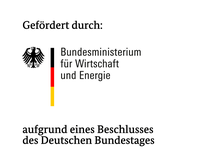Research grant in aeronautics: Publicly funded project TISTRAQ approved
The main objective of the joint project TISTRAQ (TItanium Solution Treated & RApid Quenching), which is funded by the BMWi starting 1.7.2020 as part of the German government's aviation research program, is the development of a forming process for energy- and material-efficient production of sheet metal parts made of α+β titanium alloys with increased mechanical properties by means of process-integrated heat treatment. For the first time α+β titanium alloys are heated resistively and quench formed with cooled tools. The process-integrated heat treatment (forming and quenching in one step) increases the potential for lightweight construction by enhancing mechanical properties and reduces the manufacturing costs for sheet-based titanium components by eliminating the need for subsequent heat treatment. In addition, the very short process time (STQ: short time quenching) aimed at should prevent the formation of an oxygen-enriched brittle surface layer as far as possible. The forming of α+β titanium alloys with process-integrated heat treatment leads to an ecologically and economically more efficient production of titanium structures compared to the current state of the art. At the same time, the improved mechanical properties result in a high lightweight construction potential. The STQ process thus offers great potential for increasing performance and efficiency in aerospace applications.
The process route is based on the press hardening process successfully used in automotive series production of boron steel parts. Together with the project partners, the process for titanium alloys is to be developed and it is to be proven that the process is controllable by simulation and leads to a permanent increase of the characteristic mechanical properties of α+β titanium alloys. DYNAmore takes over the simulative parts including prediction of the transformed microstructure in the STQ process, as well as mapping and prediction of the corresponding local mechanical properties of the downstream phenomenological constitutive model. With this goal achieved, the potential of the process is to be determined by optimizing the process within the simulation environment only.
The work plan provides for various experimental investigations on the cooling behaviour of TiAl6V4 at different cooling rates, as well as mechanical investigations of the generated microstructure. Based on the knowledge gained, DYNAmore develops a thermomechanically coupled simulation model, which is able to describe the entire forming process of a component. The local properties of the material are described with a model that describes the phase transformation kinetics, depending on local deformation and temperature history. In addition to the description of the model in principle, its implementation and validation, DYNAmore MCC provides extensive calibration services in order to meet the high demands on the prediction capability.
Prof. Dr.-Ing. André Haufe, head of the DYNAmore MCC, comments: "With the approval of this research project, we further expand our simulation technology competence in the industrially focused materials science sector and, together with the project partners HEGGEMANN and FAU, create the basis for a wide range of new applications for titanium sheet metal components".
The partners in the consortium are:
HEGGEMANN AG:
Founded in 1962 as "Luftfahrttechnischer Betrieb" HEGGEMANN has established itself as an internationally recognized specialist for the development and production of complex metallic lightweight structures in the aerospace industry. According to the company's motto "360° - from Engineering to Production" 220 employees realize the complete value chain for customers, from the development and series production to the production of ready-to-install structures and systems. The owner-managed company based at the Paderborn-Lippstadt airport is characterized in particular by production quality engineering for the design of production-optimized manufacturing and constant innovations. As an aviation-approved manufacturing company and certified welding specialist, HEGGEMANN contributes to the project its more than 50 years of experience in the development of manufacturing processes according to aviation quality standards. HEGGEMANN has extensive competences in the handling of high-strength titanium alloys with regard to welding, machining, sheet metal working as well as the assembly of complete components.
FAU:
The chair of General Material Properties (WW1) of the Friedrich-Alexander-University Erlangen-Nuremberg (FAU) has been engaged in research on the microstructure-property correlation of materials and the associated damage mechanisms for many decades. One focus is on light metal materials, especially titanium alloys. The chair has great expertise in the field of microstructural and mechanical characterization of materials. The chair WW1 is experimentally very well equipped: In addition to macroscopic mechanical testing methods such as tensile, compression and fatigue testing and methods for determining the mechanical (long-term) properties at high temperatures, it has extensive equipment in the field of microstructural characterization. About 30 PhD students are working at the chair in different projects funded by EU, DFG, BFS, BMBF. The chair WW1 is member of the Cluster of Excellence EXC315, Engineering of Advanced Materials, participates in several ongoing Collaborative Research Centers and Research Training Groups and has successfully obtained two ERC grants.
DYNAmore Material Competence Center (MCC):
As a software and CAE development company DYNAmore offers a wide range of engineering services, which covers the finite element software LS-DYNA, the pre- and post-processor LS-PrePost, the optimization software LS-OPT as well as numerous FE models for crash simulation (dummy, barrier, pedestrian, and human models). The simulation suite LS-DYNA is co-developed by DYNAmore GmbH. DYNAmore has many years of project and development experience in model development and calibration as well as simulation (process simulation, passenger protection, vehicle crash) in all areas of mobility (aerospace, rail and automotive). A special focus of the DYNAmore Material Competence Center (MCC), which recently moved to larger premises, is the development of material models (metals, plastics and composite materials) and the derivation of methods for their calibration and validation. This know-how is particularly relevant in the now funded TISTRAQ project, in order to be able to generate the necessary input for the constitutive models applied in the quenching and forming process.
